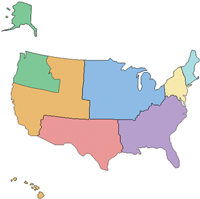
Click on the map to read about each region.
All politics are local, as the saying goes — and so in this section of Grist’s special edition on elections and the environment, we turn our attention away from the federal government to describe some of the ways the environment has made it onto the ballot at the state and local levels in 2003, and ways it’s likely to crop up in 2004. From the effort to reelect Salt Lake City’s Ross “Rocky” Anderson — one of the nation’s greenest mayors — to the standoff between a Native American tribe and the Audubon Society in Maine, these elections offer an intriguing window into the status of environmental politics at the down-and-dirty level of the grassroots.
California. The debacle that was California’s recall election took center stage in the Golden State this year. Former Gov. Gray Davis (D) was “an environmental hero in every sense of the word,” according to Rico Mastrodonato, executive director of the California League of Conservation Voters; it’s too early to tell how the environment will fare in his absence and Arnold Schwarzenegger’s (R) rather unmistakable presence. One thing’s certain, though: From energy to endangered species and virtually everything else on the environmental agenda, California’s governor wields tremendous power — and makes decisions that often have an impact throughout the country. Stay tuned.

Colorado. While Colorado’s political climate doesn’t match the circus-like atmosphere of California’s recent recall election, the state nevertheless has a lot at stake this election cycle. Referendum A asks voters to approve $2 billion for water-storage projects, of which $100 million must be spent on water conservation. Despite the hint of an environmental agenda, greens are strictly opposed. “The main thing it’s trying to do is create political momentum for building new dams,” says Carrie Doyle of the League of Conservation Voters. Opposition to the referendum has brought the conservation community into cahoots with rural Republicans and other unlikely comrades.
Montana. Montana has no statewide elections this year, but the environmental community is rallying around city council elections in six municipalities, throwing its weight behind candidates committed to smart growth and protection of open space and parks. The candidates supported by enviros include Jack Johnson and Peggie Gaghen in Billings and Steve Kirchhoff and Joe Frost in Bozeman.
Utah. Environmentalists are doing all they can to ensure the reelection of Salt Lake City Mayor Ross “Rocky” Anderson (D), one of the nation’s greenest mayors. Anderson has committed Salt Lake to abiding by the Kyoto Protocol on climate change, encouraged bicycle commuting, helped make the city more pedestrian-friendly, championed open space, and fought the construction of a massive outlet mall — dubbed “the sprawl mall” — just outside city limits. “He’s one of the crown jewels in the state,” says Mark Clemens, chapter coordinator for the Utah branch of the Sierra Club, which is supporting Anderson’s reelection campaign. “In an off-year election in which relatively low turnouts can result in unexpected outcomes, we’re not going to be resting on our laurels.”

Oregon. In Oregon, which will hold no statewide elections this year, the political focus right now is on gearing up for next year. The 2004 ballot may include an initiative on management of the Tillamook temperate rainforest. A coalition of environmental groups is pressing for 50 percent of the area to be set aside as a reserve, with the other half available for sustainable harvesting.
Oregon enviros are also getting ready to play their part in the national election. “We’re making sure we can educate the public about the [Bush administration’s] systematic dismantling of environmental rules and policies, on forest issues, air issues, water issues,” says Paul Shively, the Sierra Club’s regional representative for the Northwest.
Washington. In Washington, there are two key green issues on the agenda for 2004: a bill that would deal with in-stream flow requirements while protecting salmon habitat, and an energy portfolio bill that would encourage use of renewable sources such as wind and solar. In 2003, growth-management issues are at stake in some local elections, such as that in Snohomish County north of Seattle.

Arizona. Tucson’s propositions 200 and 201 (together known as the Comprehensive Transportation Initiative) would levy a three-10ths-of-a-cent sales tax to fund better bus service, a new Bus Rapid Transit express system, and a new light rail system in the downtown, plus new sidewalks and bikeways and an extension of an existing trolley line. The plan is supported by a coalition of environmental groups, neighborhood associations, social service groups, and small businesses. One main organizer says the likelihood of success is good but not certain.
New Mexico. An unusual coalition of environmentalists, small-business owners, Democrats, and Republicans in Albuquerque is fighting an uphill battle to kill a $21 million bond that would help fund the construction of two major roads through Petroglyph National Monument. The coalition says the roads would promote sprawl; moreover, it notes that the city’s residents would shoulder the cost of “improvements” that would mainly benefit developers and future commuters from outside the city. The vote is slated for Oct. 28.
Also in Albuquerque, the local chapter of the Sierra Club has endorsed one of its own, activist Martin Heinrich, for the District 6 City Council seat. There are six candidates vying for the spot, but Heinrich is cautiously optimistic. District 6 is an older neighborhood and needs tax dollars to repair its leaky water mains to improve water conservation. The nine-member City Council has recently passed environmental measures by a five-four margin, and the outgoing District 6 representative is an environmentally friendly Republican.

Michigan. On Nov. 4, residents of Ann Arbor city and township will vote on a landmark proposal to protect farmland and open space. The Ann Arbor Parks and Greenbelt Proposal would expand the scope of the city’s parkland acquisition program to also preserve land within a greenbelt around the city. The plan would protect thousands of acres of the area’s best farmland and rolling hills. Home-builder associations have pledged to spend $400,000 to defeat it.
Missouri. A coalition of Missouri environmentalists and conservationists, including the Audubon Society, hunters, and anglers, will work in 2004 to make sure legislators don’t remove the state’s dedicated one-half cent sales tax that now goes to the Department of Conservation. The legislature might also propose splitting the tax with the Department of Education, in which case the Department of Conservation could lose $45 million per year.
Meanwhile, gravel mining has become an increasing concern for several Missouri groups, including anglers, environmentalists, and water-quality organizations. Missouri is one of the leading states for gravel mining, which is wreaking havoc on the Mississippi and Missouri Rivers, as well as smaller streams and creeks. Currently, no regulations exist to control the mining (although unenforceable guidelines are on the books). The groups involved want legislation passed that would create rules for gravel mining and a mechanism to enforce them.
Wisconsin. Wisconsin environmentalists are concerned about the 2004 reelection bid of Sen. Russ Feingold (D), a long-time champion of green causes. Potential challengers for his seat include the Republican former lieutenant governor of the state, Margaret Farrow.

Connecticut. Voters in Glastonbury are being asked to pony up some $30 million for the environment this year: $26.9 million for the renovation of a 45-year-old sewage treatment plant and $3 million to replenish the coffers of an open-space preservation fund. Nicer sewage and more space are politically popular commodities, and the referenda would normally be expected to pass without controversy. However, with local homeowners grumpy about rising property taxes and skyrocketing municipal debt, the future of Glastonbury’s poop and farmland is uncertain.
Maine. Penobscot Nation Chief Barry Dana says Maine’s great outdoors has nothing to fear from a massive casino, but the Maine chapter of the Audubon Society isn’t buying it. In a highly controversial statewide ballot measure, Maine voters will decide the fate of the proposed $650 million resort, which would be run by the Passamaquoddy Tribe and the Penobscot Nation. The Maine Audubon Society and the state Department of Environmental Protection oppose the casino, contending that it would destroy sensitive habitat. Opponents also worry that vague language in the referendum leaves it unclear whether the tribal developers would have to follow state environmental laws. (Dana was recently named a “Water Hero” by Outside magazine for his work to protect Maine’s waterways from dioxin.)
Massachusetts. With a much-hyped federal bioterror laboratory planned in Boston’s South End, only one of the eight candidates for city councilor at-large is speaking out against it. The lab would be one of only four Biosafety Level 4 facilities in the nation (those that can handle deadly pathogens like Marburg and Ebola), and it has been lauded as a big economic win for the city. But aspiring councilor Felix Arroyo says the lab will endanger the health and livelihoods of the South End’s mostly working-class residents. If elected to one of the four councilor at-large seats, he will seek to pass a city ordinance to ban Level 4 laboratories from Boston.

New Jersey. While most of the rest of the country snoozes through an off year, New Jersey is gearing up for a big election season, with all 40 seats in an evenly split state Senate up for grabs. Lawmakers have seized the opportunity to front a massive attack on suburban sprawl, with a $150 million statewide bond initiative to increase funding for the Green Acres open-space preservation program. A whopping 38 counties and municipalities are also seeking to pass open-space initiatives, with a combined price tag of upwards of $130 million.
New York. The man who brought local currency to Ithaca in 1991 is now hoping to become its first Green mayor — and he just might succeed. Paul Glover, local activist par excellence, creator of Ithaca Hours (legal tender within a 20-mile radius), and the alternative weekly Ithaca Times readers’ pick for best mayoral candidate, is considered a serious contender in a three-way race that has local passions running high. If elected, he will join recently elected Jason West of New Paltz as New York state’s second Green mayor. Glover is also being courted by the Green Party as a potential 2004 presidential pick.
Meanwhile, in Long Island’s Suffolk County, both candidates in a heated race for county executive are vying for the mantle of environmental champion. A popular land-preservation initiative in the county has been hopelessly immobilized by scandal, and the resulting ire has brought the environment front and center in the campaigns of both Democrat Steve Levy and Republican Edward Romaine. Levy won the endorsement of the Long Island Environmental Voters Forum; Romaine’s TV spots feature him bicycling through the woods and touting his squeaky-clean environmental record in county government.
Pennsylvania. Pennsylvania environmental groups and politicians of all stripes are closely watching a $150 million bond initiative for open space in Montgomery County. While heavily Republican on the local level, Montgomery is a hotly contested swing district in statewide races. Open-space initiatives are generally popular, but in a bad economy, the number of county voters who are willing to put their money where their mouths are may serve as a barometer for how committed Penn residents really are to the environment. It’s a good bet that Gov. Edward Rendell (D), who has yet to make good on a few environmental campaign pledges, will be keeping an eagle eye on the outcome.
The GOP also dominates Pennsylvania’s rural Chester County, where registered Republicans outnumber Democrats two to one. Still, when the environment talks in Chester, the GOP can’t afford not to listen. In a four-candidate race for three county commissioner seats, Republicans Carol Aichele and Don Mancini are falling all over themselves to support Landscapes, a popular anti-sprawl project drafted by Dems. If elected, Aichele and Mancini have each pledged to commit $60 million to the project.

Florida. Enviros in the Sunshine State aren’t anticipating a busy year for 2003; instead, they are setting environmental agendas for 2004, when more voters will head to the polls. One concern is a push by the Florida legislature to redesign the ballot initiative process. Legislators are considering ideas ranging from obliterating the ballot initiative process completely to requiring a supermajority vote for a new constitutional amendment. Environmentalists are keeping their eye on this issue, which will affect how future green legislation gets made.
Also in Florida, there’s talk of an initiative that would guarantee funding for land conservation. The reasoning behind it? With budget cuts always a threat, environmentalists want to ensure that the state doesn’t raid its conservation funds during tough economic times.
Louisiana. Louisiana enviros have already had a triumph at the ballot box this year. On Oct. 4, voters passed three coastal-erosion measures — important steps for a state that loses 25 to 30 miles of coastline each year. Proposition 1 allows money from the Mineral Revenue Audit and Settlement Fund to be used to help establish and maintain the Wetlands Conservation and Restoration Fund. Proposition 2 dedicates a small percentage of money from the state’s tobacco settlement to coastal restoration. And Proposition 3 limits the size of the payout in legal cases when property is devalued as a result of the restoration or protection of wetlands.
Virginia. There aren’t any hot-button environmental issues on the ballot in Virginia in 2003, but myriad topics are expected to gain momentum over the course of the next year, including debates over the barging of solid waste on the James River and the importation of out-of-state trash. Groups such as Campaign Virginia will continue to push for laws and agreements to stem the stinky influx, urging trash-exporting states to take responsibility for disposing of their own waste. In northern Virginia, near Washington, D.C., the focus is transportation and smart growth. The Coalition for Smarter Growth has called on all Virginia candidates to adopt a more comprehensive and focused approach to sprawl, development, and traffic.


